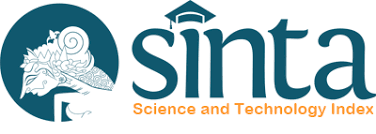Entrepreneurship Mentoring Using a Business Model Cloud Kitchen in Vocational High Schools
Abstract
Introducing the cloud kitchen concept to these vocational high school students aims to boost their competence by improving knowledge, fostering familiarity and understanding, and developing curriculum. It also seeks to shape an entrepreneurial mindset and increase their interest in entrepreneurship through the Cloud Kitchen business model. The program's methodology involved lectures and discussions. It began with a pre-test to gauge students' initial knowledge, familiarity, and understanding, concluding with a post-test to measure the activity's effectiveness. The pre-test results revealed that students' knowledge of the cloud kitchen business was minimal, at 19.8%. However, the post-test showed a significant increase in their knowledge, reaching 90.5%. The primary hurdles faced by SMK Ethika students when embarking on entrepreneurship were the need for substantial initial capital without its availability, and the fear of launching new businesses due to a lack of understanding of easily manageable business types. The cloud kitchen business model is well-suited for implementation, as it requires lower capital and offers a great opportunity to start a culinary business by leveraging digital technology. This activity provides a tangible contribution to the community, particularly the vocational education sector, by enhancing students' capacity and readiness to participate in the digital economy. The direct impacts include increased knowledge, improved mental preparedness, and business inspiration for students to begin developing independent digital culinary businesses.
Downloads
References
Alma, B. (2008). Kewirausahaan Untuk Mahasiswa dan Umum. Bandung: Alfabeta.
Ariadi, W., Syafii, M., Rerung, A., Tapilatu, T., & Yendra, Y. (2023). Pendampingan Kewirausahaan bagi Usaha Mikro Kecil dan Menengah dari Siswa SMK, Mahasiswa dan Alumni STIE Port Numbay Jayapura. PengabdianMu: Jurnal Ilmiah Pengabdian Kepada Masyarakat, 8(3), 375–380. https://doi.org/10.33084/pengabdianmu.v8i3.4327
Choudhary, N. (2019). Strategic analysis of cloud kitchen–a case study. Management Today. Management Today. 9(3), 184-190. http://dx.doi.org/10.11127/gmt.2019.09.05
Dewi, S. T., Oxygentri, O., & Arindawati, W. A. (2022). Strategi Komunikasi Pemasaran Bittersweet By Najla Dalam Menarik Minat Konsumen. Jurnal Ilmiah Muqoddimah Jurnal Ilmu Sosial Politik dan Hummaniora, 6(2):438 .http://dx.doi.org/10.31604/jim.v6i2.2022.438-443
Dharmawati, M. (2020). Kewirausahaan. Depok: Raja Grafindo Persada.
Fridayani, H. D. (2021). Cloud Kitchen: Strategy For Indonesian Culinary Business (SMEs), Growth During And Post Pandemic Era. Management Research And Behaviour Journal. 1(2), 41-46. https://doi.org/10.29103/mrbj.v1i2.5128
Hemant, K. J. (2015). Entrepreneurship education: a need for reflection, real-world experience, and action. International Journal of Entrepreneurial Behavior & Research. 21(5), 690-708. http://dx.doi.org/10.1108/IJEBR-07-2014-0123
Hery, A. (2021). Kewirausahaan. Bandung: Yrama Widya.
Hidayat, A. R. (2022). Marketing Communication Strategy for Coffee Through Digital Marketing. Return Study of Management Economic and Business, 1(4), 139-144. https://doi.org/10.57096/return.v1i4.54
Prasetio, H. E., Dhurofallathoif, M., Nujum, T., Jelita, S. I. P., Rofi’ah, M., & Nisa’, R. (2023). Pendampingan Pengolahan Kotoran Sapi Menjadi Pupuk Organik. Mafaza : Jurnal Pengabdian Masyarakat, 3(1), 75–88. https://doi.org/10.32665/mafaza.v3i1.1713
Iwu, C. G., Opute, P. A., Nchu, R., Eresia-Eke, C., Tengeh, R. K., Jaiyeoba,O., & Aliyu, O. A. (2019). Entrepreneurship education, curriculum and lecturer-competency as antecedents of student entrepreneurial intention. International Journal of Management Education. 19(1), http://dx.doi.org/10.1016/j.ijme.2019.03.007
John, K. T. (2021). Digital Disruption: The Hyperlocal Delivery and Cloud Kitchen Driven Future of food services in post-COVID India. International Hospitality Review, 37 (1), 161-187. https://doi.org/10.1108/IHR-06-2021-0045
Kenney, M. &. (2016). The Rise of the Platform Economy. Issues in Science and Technology, 32(3), 61-69.
Liu, Xuanyu. (2023). Digital Transformation in the Food and Beverage Industry: Best Practices for Supply Chain Optimization. Strategic Management Insights, 1(8):41-49. http://dx.doi.org/10.70088/238x5936
Machdar, N. &. (2022). Cloud kitchen: Closing the demand gap in the new normal era for the food services industry. Semesta, 2(1), 72-78. https://semesta.upnjatim.ac.id/submissions/index.php/semesta/article/view/38
Mathur, P. &. (2023). Consumer purchase intention and behavior toward cloud kitchen (pandemic opportunity) with reference to India: An empirical examination. Jindal Journal of Business Research. 12(2), 194-208. https://doi.org/10.1177/22786821231166790
Mintel. (2022). Consumer Trends in Food and Drink: Health, Sustainability, and Digital Innovation. Diambil kembali dari Mintel Group Ltd.
Muchson, M. (2017). Entrepreneurship (Kewirausahaan). Kediri: Guepedian.
Mustafida, N., Kartika, T. P. D., Kholid, I., Tianto, R., Mursita, L. Y., & Permata, A. S. S. (2024). Pelatihan Dan Pendampingan Kewirausahaan Kreatif Bagi Siswa Smk Untuk Mendukung P5 Kurikulum Merdeka. Jurnal Abdi Insani, 11(2), 2075–2085. https://doi.org/10.29303/abdiinsani.v11i2.1658
Nambisan. (2017). Digital entrepreneurship: Toward a digital technology perspective of entrepreneurship. Entrepreneurship Theory and Practice, 41(6), 1029-1055. http://dx.doi.org/10.1111/etap.12254
Nurdina, H., Martono, T., & Sangka, K. B. (2019). Tantangan dan Peluang Sekolah Menengah Kejuruan Melalui Pendidikan Kewirausahaan dalam Menghadapi Era Digital. Jurnal Surya Edunomics, 3(1), 22-34. Retrieved from https://jurnal.umpwr.ac.id/suryaedunomics/article/view/999
Rafika, R., Suwatno, & Amir, M. . (2018). Analisis Faktor-Faktor Yang Mempengaruhi Pendidikan Kewirausahaan(Entrepreneurship Education) Di Perguruan Tinggi Negeri Kota Bandung. SOSIO-DIDAKTIKA: Social Science Education Journal, 1(1), 47-53. https://doi.org/10.15408/sd.v1i1.9522
Ries, E. (2011). The Lean Startup: How Today's Entrepreneurs Use Continuous Innovation to Create Radically Successful Businesses. New York: Crown Business.
Rifky, S., Putra, J. M., Ahmad, A. T., Widayanthi, D. G. C., Abdullah, G., Sunardi, S., & Syathroh, I. L. (2024). Pendidikan Yang Menginspirasi: Mengasah Potensi Individu. Yayasan Literasi Sains Indonesia
Rizky, M., Yuliati, L. N., & Hasanah, N.Rizky, M., Yuliati, L. N., & Hasanah, N. (2023). Pengaruh Social Media Marketing Instagram Terhadap Repurchase Intention Melalui Experiential Marketing dan Brand Trust. Jurnal Aplikasi Bisnis Dan Manajemen. 9(2), 658. https://doi.org/10.17358/jabm.9.2.658
Rohali, A. P. (2024). Pengaruh Kualitas Produk, Sosial Media Marketing Dan Store Atmosphere Terhadap Minat Beli Kembali Di Kopi Nako Kota Wisata Cibubur. Manajemen: Jurnal Ekonomi, 6(3), 420 – 430. https://doi.org/10.36985/x7jdm487
Runtoni. (2023). emberdayaan Guru Sebagai Upaya Pengembangan Kewirausahaan Santri Di Pondok Pesantren. Innovative: Journal Of Social Science Research, 3(3), 4564–4665. Retrieved from https://j-innovative.org/index.php/Innovative/article/view/2640
Sari, D. M., Pratiwi, A., Mubariqoh, A. I., Andika, M., Nuraini, S. A., & Fitri, A. (2021). Dampak Layanan Online Food Delivery Terhadap Pendapatan Usaha Kuliner Di Bandar Lampung Pada Masa Pandemi Covid-19. Jurnal Ilmiah Mahasiswa Agroinfo Galuh, 9(1), 398-407. https://dx.doi.org/10.25157/jimag.v8i3.6149
Semeru Research Institute. (2021). Diambil kembali dari Ekosistem Kewirausahaan Pemuda Di Indonesia: https://smeru.or.id/id/research-id/ekosistem-kewirausahaan-pemuda-di-indonesia
Sunarti, Suherman, Rusdiyani Isti. (2025). Analisis Kesiapan Berwirausaha Siswa Kelas XII Sekolah Menengah Kejuruan. Edukatif: Jurnal Ilmu Pendidikan, 7(1), 122-131. https://doi.org/10.31004/edukatif.v7i1.7978
Supriyati, S., Ronny, R., & Herlambang Cahya Pratama, Y. (2023). Pendampingan Akselerasi Pembelajaran Kewirausahaan Berbasis Outcome Based Education pada Guru SMK Mamba’ul Ihsan Gresik. Hayina Jurnal Pengabdian Masyarakat. 3(1), 17-26. https://doi.org/10.31101/hayina.3280
Tokkozhina, U. M. (2023). Decentralizing Online Food Delivery Services: A Blockchain and IoT Model for Smart Cities. Mobile Networks and Applications, 29(1):59-69. http://dx.doi.org/10.1007/s11036-023-02119-5
Vembri, Aulia Rahmi, Ifahda Pratama Hapsari, Hadi Ismanto, & Beni Dwi Komara. (2025). Pelatihan dan Pendampingan Penguatan Nilai-Nilai Pemasaran dan Kewirausahaan pada Siswa Putri SMK Taruna Jaya. Fundamentum : Jurnal Pengabdian Multidisiplin, 3(1), 35–46. https://doi.org/10.62383/fundamentum.v3i1.642
Villanueva, Ma. C. C., Alejandro, A. F., & Ga-an, Ma. L. L. P. (2023). Measuring the Service Quality, Customer Satisfaction, and Customer Loyalty of Selected Fast-Food Restaurants during the COVID-19 Pandemic. Open Journal of Business and Management,, 11(03), 1181-1207. http://dx.doi.org/10.4236/ojbm.2023.113066
Wiwi, Y. N., & Giatman, M. (2024). Membangun Jiwa Entrepreneurship pada Siswa Sekolah Menengah Kejuruan (SMK). Jurnal Pendidikan Tambusai, 8(1), 7801-7808. https://doi.org/10.31004/jptam.v8i1.13566


.png)

.png)




.png)
.png)


